Edie Melson's Blog, page 71
November 6, 2023
The Writer Has One Job

by PeggySue Wells @PeggySueWells
Recently I watched Disney’s animation movie, The Jungle Book , with two of my grandchildren.
When the Bengal tiger, Shere Kahn comes on the scene, the six-year-old stated, “I don’t like him.”
Though a fictional character, meaning Shere Kahn is not real, the author created the main antagonist of Rudyard Kipling’s Jungle Book with skill. For the animation feature film, the actor who voiced the character did such a good job that my young viewers had an emotional reaction to the tiger.
A writer has one job to do and that is to elicit an emotional response in the reader.
That emotional response can run the gamut from dislike (as in the case of Shere Kahn), to affection. Viewing the animated Jungle Book film, my grands and I felt:Dislike for Shere KahnThe warmth of family connections through Raksha and Rama, the wolf parentsThe weight of responsibility through Bagheera the PantherJoy and appreciation for life through Baloo the BearWonder for future possibilities through the village girlFun through King Louis the Orangutan when we recognized his voice as the singer Louis Prima whose song is among the many silly tunes this Mimi often sings around the house, Yes, We Have No BananasBy making an emotional connection with the reader, an author gives the reader reason to keep turning pages. The reader has a personal investment in the story, an interest in seeing what will happen to the character the reader cares about as well as what will happen to the antagonist the reader does not like.
Some interests include:Will the protagonist get the goal?What will be the personal cost to the main character?Why is the antagonist behaving that way?Will the unlikable character change?What will be the consequences for the antagonist?Among the essentials for a story is a character the reader cares about. As a writer, how can you incite an emotional connection between your characters and your readers? What qualities of the protagonist and antagonist will the reader find relatable? Compelling? Off-putting? Revolting?
Emotions your characters, plot, setting, and dialog can elicit in your reader include:AdmirationAgitationAngerAnnoyanceAnticipation BetrayalBlissCalmCompassionConjectureCuriosityDelightDeterminationDisapprovalDiscoveryDisgraceDisgustDisturbedDoubtEagernessElationEmpathyEncouragedEnvyExcitementExpectancyFearFlusteredForgivenessGriefHappinessHatredHopeHorrorImpatienceIncredulityInspirationJealousyJoyLoathingMelancholyMiseryOffenseOutragePerturbedPridePurposeRedemptionRegretRemorseRevelationSadnessSatisfactionSentimentalityShockSpeculationSurpriseSuspicionSympathyThrilledTrustWonder
The list of possible emotions a reader can feel is potentially endless which is great news for the writer. An author is not limited to eliciting only basic or simple emotions. Consider the literary and film characters that elicit strong feelings for you. What makes you connect with a character? What makes you feel repelled? What about the way the information is shared brings about a fresh consideration of the topic?
Writing is the art of telling story in a fashion that engages the reader. Even better, engage your reader by making your writing an experience that generates a variety of responsive and reactive feelings.
TWEETABLEThe Writer Has One Job - great insight from author @PeggySueWells on @EdieMelson (Click to Tweet)
 Tropical island votary and history buff, PeggySue Wells parasails, skydives, snorkels, scuba dives, and has taken (but not passed) pilot training. Writing from the 100-Acre Wood in Indiana, Wells is the bestselling author of thirty books including The Slave Across the Street, Slavery in the Land of the Free, Bonding With Your Child Through Boundaries, Homeless for the Holidays, Chasing Sunrise, and The Ten Best Decisions A Single Mom Can Make. Founder of SingleMomCircle.com, PeggySue is named for the Buddy Holly song with the great drumbeat. At school author visits, she teaches students the secrets to writing and speaks at events and conferences. Connect with her at www.PeggySueWells.com, on Facebook at PeggySue Wells, and LinkedIn at linkedin.com/in/peggysuewells
Tropical island votary and history buff, PeggySue Wells parasails, skydives, snorkels, scuba dives, and has taken (but not passed) pilot training. Writing from the 100-Acre Wood in Indiana, Wells is the bestselling author of thirty books including The Slave Across the Street, Slavery in the Land of the Free, Bonding With Your Child Through Boundaries, Homeless for the Holidays, Chasing Sunrise, and The Ten Best Decisions A Single Mom Can Make. Founder of SingleMomCircle.com, PeggySue is named for the Buddy Holly song with the great drumbeat. At school author visits, she teaches students the secrets to writing and speaks at events and conferences. Connect with her at www.PeggySueWells.com, on Facebook at PeggySue Wells, and LinkedIn at linkedin.com/in/peggysuewells
Published on November 06, 2023 22:00
November 5, 2023
Safety Tips for Writers Online

by Edie Melson @EdieMelson
Writers have many different tools and responsibilities. One of those is reaching readers online. But with that comes exposure to those with unsavory motives and plans. So how is a writer to stay safe while building a platform? Here are some safety tips to put into place and minimize your risk.
Here are some tips to help writers stay safe online:
Be Wise. I cannot emphasize this one strongly enough. If someone makes you uncomfortable, act on your feelings. “Have you heard the rumors your fiend is spreading about you?” or “This is a hilarious video just uploaded about you.” Stop. Think. Then DON’T click that link! Assume it’s a lie. Awhile back, I got an email from an online company confirming a large purchase with my credit card. I knew I hadn’t made any purchases, but still had to fight the urge to panic. My gut response was to reply to the email. Thankfully, I took a step back and looked more closely at the email. I noticed several things that made me suspicious. I immediately did an online search for scams involving that company and came up with pages of recent victims. I contacted the company directly (not through the info in their email) and confirmed the email was a ruse to steal my information. Never give out sensitive information. Let me repeat, NEVER GIVE OUT SENSITIVE INFORMATION! Companies don’t ask for bank account info, passwords or other information over the internet. First, if you’re a customer, they already have all of your information they need. Keeping up with personal passwords is a liability for companies. Stop believing that ANYTHING on Social Media is private. First, it’s not. I run my social media life with one rule: If I wouldn’t share the post on a billboard in my home town, I do NOT share it on social media. Never share personal data while you’re on a public Wi-Fi. This includes logging into sites when you must type in a password. It’s okay to bring up a site you’re already logged into, but NEVER type a password in a public place. Not only is it a risk, but it’s so easy to counterfeit a public Wi-Fi and make it look legitimate. Use two-level authentication whenever possible. For instance, when I log into my Google account from a new device or new location, I receive a text message with an additional code I must type in. This has saved me so many times. A lot of networks and platforms offer this option and I always sign up for it. It may seem frustrating when you’re in a hurry, but do it anyway. The truth is, when we’re rushed is the time when we’re not paying attention and we’re often more vulnerableHave a different password for EVERY site you’re on. And change your passwords every six months. I know you don’t want to hear it, but I cannot emphasize this strong enough. Your password must be different for every account you have. That can seem overwhelming. If you’re like me you probably have dozens of accounts, so how can we keep up with all those passwords? Trust me, it’s not with sticky notes or a file on your computer. Every single time I share this information, someone confesses that they have a file on their computer and no one will know it’s there because it’s labeled INFO or something similar. To make this workable, find a digital password keeper with an app. My personal choice is LastPass, I use the paid version with Family Sharing, but the free version is great too.Look for 36-bit encryptionRecommendations from people you trustOnline articles from reputable sites
Now let's look deeper at what to do when things do go south!
What should you do when something makes you uncomfortable?
The biggest thing is do NOT be tempted to be polite when you’re worried. This is similar to following your instincts in that we often push down our uncomfortable feelings for the sake of being polite. If someone is tweeting to you, sending you repeated Facebook messages, or contacting you in any way that makes you uncomfortable, don’t ignore your feelings.First, if appropriate, confront the person making you uncomfortable and request they respect your boundaries. Next, If they don’t adhere to your guidelines, immediately block them from the social media networks where they are contacting you. Finally, report them to the social media network(s) where the infraction occurred.
These are the things I do to stay safe online, what are some of your best tips? Be sure to leave your thoughts in the comments section below.
Don't Forget to Join the ConversationBlessings,Edie
TWEETABLESafety Tips for Writers Online from @EdieMelson (Click to Tweet)
 Edie Melson is a woman of faith with ink-stained fingers observing life through the lens of her camera. No matter whether she’s talking to writers, entrepreneurs, or readers, her first advice is always “Find your voice, live your story.” As an author, blogger, and speaker she’s encouraged and challenged audiences across the country and around the world. Her numerous books reflect her passion to help others develop the strength of their God-given gifts and apply them to their lives. Connect with her on her website, through Facebook, Twitter and Instagram.
Edie Melson is a woman of faith with ink-stained fingers observing life through the lens of her camera. No matter whether she’s talking to writers, entrepreneurs, or readers, her first advice is always “Find your voice, live your story.” As an author, blogger, and speaker she’s encouraged and challenged audiences across the country and around the world. Her numerous books reflect her passion to help others develop the strength of their God-given gifts and apply them to their lives. Connect with her on her website, through Facebook, Twitter and Instagram.
Published on November 05, 2023 22:00
November 4, 2023
Writers, What Do You See?

by Audrey Frank @AudreyCFrank
The word of the Lord came to me: “What do you see, Jeremiah?” I see the branch of an almond tree,” I replied.
The word of the Lord came to me again: “What do you see?” “I see a pot that is boiling,” I answered. “It is tilting toward us from the north.”
Jeremiah 1:11, 13
God initiated Jeremiah’s writing journey by speaking to him. Jeremiah practically laughed out loud with doubt, listing the reasons he could not possibly be used by God to steward words. Instead of rebuking Jeremiah for doubting, God drew nearer. Their conversation can be found in Jeremiah 1:4-10.
How kind of God to talk Jeremiah through his doubt and fear. With encouragement instead of reproach, God used the circumstances and tangible things around Jeremiah to teach him how to hear His words and share them with others. We can sense God’s gentleness and belief in Jeremiah in His first question.
What do you see, Jeremiah?
I see the branch of an almond tree.
Almond tree branches and boiling pots were the stuff of domestic life in Jeremiah’s day. Mundane. Unremarkable. Unless the One asking you to take a look at them is God.
With God, the commonplace becomes extraordinary.
Thus began a pattern in Jeremiah’s writing life. He observed; he listened for the word of the Lord through what he saw; he obeyed by sharing the words God gave. The Lord remained by Jeremiah’s side, instructing him what to say and write for the rest of his life. Even when he was taken captive and his words were burned.
81 times, Jeremiah states, “The word of the Lord came to me.”
Often God’s words came to Jeremiah through what he saw.
Amy Carmichael, missionary to India, called this kind of hearing from God Figures of the True.
A figure of the true is a representation of something that is real. The phrase originates in Hebrews 9:24. Before Jesus came to earth, human priests served as figures of the true mediator who would one day stand before God’s presence on behalf of sinful humanity. And up until that time, the temple served as a figure of the true dwelling place of God.
God uses figures of the true to teach us Truth.
He is still asking writers today, What do you see?
I see on my desk right now two glasses filled with a variety of unique writing instruments. They remind me of you, dear writers, unique and diverse. Some with fine tips for precise writing. Some with artistic, broad nibs for artful prose. Some are practical. Others are highlighters. Three are whimsical with floppy pink silk flowers. They cheer me up just to look at them. Some instruments bear permanent ink, and others strong erasers.
The truth is we are instruments on God’s writing desk, and we are diversely gifted and purposed. Each one is necessary.
What do you see today, writer?
The world needs your unique writer’s voice to explain what is True. Your answer to today’s question may be the writing prompt you’ve been waiting for.
Lord, show me Truth and give me Truth words for others. Amen.
TWEETABLEWriters, What Do You See? Thoughtful insight from author @AudreyCFrank on @EdieMelson (Click to Tweet)
 Audrey Frank is an author, speaker, and storyteller. The stories she shares are brave and true. They give voice to those whose words are silenced by shame, the hard things in life that don’t make sense, and the losses that leave us wondering if we will survive. Audrey and her family have spent over twenty years living and working among different cultures and world views, and she has found that God’s story of redemption spans every geography and culture. He is the God of Instead, giving honor instead of shame, gladness instead of mourning, hope instead of despair. Although she has three different degrees in communication and intercultural studies, Audrey’s greatest credential is that she is known and loved by the One who made her.
Audrey Frank is an author, speaker, and storyteller. The stories she shares are brave and true. They give voice to those whose words are silenced by shame, the hard things in life that don’t make sense, and the losses that leave us wondering if we will survive. Audrey and her family have spent over twenty years living and working among different cultures and world views, and she has found that God’s story of redemption spans every geography and culture. He is the God of Instead, giving honor instead of shame, gladness instead of mourning, hope instead of despair. Although she has three different degrees in communication and intercultural studies, Audrey’s greatest credential is that she is known and loved by the One who made her.Audrey is the author of Covered Glory: The Face of Honor and Shame in the Muslim World (Harvest House Publishers), an outpouring of Audrey’s heart to introduce others to the God of Instead. Shame is not unique to the developing world, the plight of the women behind veils, young girls trafficked across borders; shame is lurking in hearts everywhere. Through powerful stories from women around the world, Covered Glory illuminates the power of the Gospel to remove shame, giving honor instead. Available at favorite booksellers: BARNES & NOBLE, BOOKS A MILLION, AMAZON.
Published on November 04, 2023 22:00
November 3, 2023
A Writer’s Superpower: The Ability to Time Travel
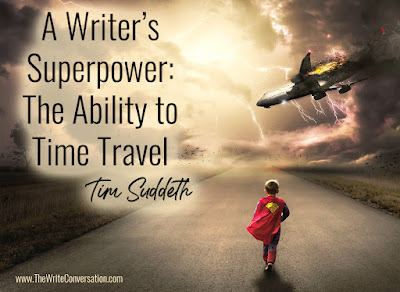
by Tim Suddeth @TimSuddeth
Have you ever wanted a do-over? You had coffee with a buddy, or your boss called you into his/her office, then an hour later you think, “Wow. Wished I’d said that.”
If only you could get a do-over, or in golfing lingo, a mulligan.
As a writer, you get a chance to use your do-over, or time-travel, on your writing. Thankfully, writing isn’t like speaking when, once you open your mouth, it’s too late to think. Once you say it, it’s out of your hands, uh, mouth.
But in writing, you blurt out the first draft with all those pesky incomplete thoughts, cliches, and typers, uh, typos, that seem to slip in once you think you’re finished. They can drive you crazy. And many hopeful writers get so caught up in making a perfect story that they never finish it.
That’s when you can call on your time-travel superpower. This superpower lets you go back and correct all false starts, formatting errors, and homonyms. It lets you go from a disaster in the kitchen to the perfect red velvet cake. Yum.
3 Ways Writers Time Travel
1. Rewrites or Substantive Edits
So, you’ve finished your first draft, whether it’s a devotion, blog post, essay, or book. Now’s your chance to go back through and find the areas where you can strengthen it. With this edit, we’re looking at the big picture. Tenses, POVs, chronology—are they all consistent? You don’t want to have your main character leaving the office to mail a letter and realize that it’s Sunday. The post office would be closed.
Have you chosen the right main character? Usually, you want the main character to undergo the biggest emotional, psychological, and spiritual changes. Sometimes, while journeying through the story, characters can surprise you.
Are your thoughts clear? In fiction, have you given enough description to help your reader paint a picture? In an essay or article, are your arguments complete and concise? Are you assuming that your reader has knowledge that you haven’t addressed?
Are your facts correct? Was the family traveling in a Model A or a Packard? Was it Elijah or Elisha who saved the widow’s son?
Would the story sound better in first or third person? Is the location and time period, correct? Or should you vary the scenes more?
These edits are where you get the dents and major scratches out of your work.
2. Copyediting
Now we need to clean up your work even more. Put some accessories and redo the interior on your jalopy.
Look for errors in grammar, punctuation, and tense. Some words, like dialogue and dialog, have two correct spellings. And those crazy English people have their own ways to do things. Be sure your resources are for the right audience.
3. Proofreading
After doing the first two edits, I’m ready to throw my soon-to-be bestselling classic against the wall. I’ve read it so many times, I can’t remember what I’ve left in it and what I’ve taken out.
But, fortunately, despite it wearing on my nerves, I get another crack at it. I get to wash and polish my jalopy until it shines.
I need to read through it one last, or two or three, times. I made several edits during the rounds of edits, causing some sentences to be changed multiple times and some words being unintentionally left out.
Now, I get to time travel back to complete the sentences. Verify that my paragraphs are complete, that homonyms or weasel words haven’t crept back in. Also ensure that using find and replace didn’t mess up other words in the writing.
Time Travel Kryptonite
There is one area where, as much as we wish, our time travel superpower just won’t work. I even hate to mention it in front of fearful writers, and we all are. It’s when we come face-to-face with a, gulp, deadline. (Take a breath.)
I know how you feel. Pity parties are the only answers. And schedules.
Rewriting, editing, or time travel. No matter what you call it, they are powerful and crucial tools for writers. We hear legends of earlier, famous writers who wrote a masterpiece in one sitting.
But how many of us really want to do that? Not after you’ve had that high feeling of having a book, article, or blog post published, to only see a big, fat typo in the first paragraph. Or worse, have a reader point it out.
TWEETABLEA Writer’s Superpower: The Ability to Time Travel from @TimSuddeth on @EdieMelson (Click to Tweet)
 Tim Suddeth is a stay-at-home dad and butler for his wonderful, adult son with autism. He has written numerous blogs posts, short stories, and three novels waiting for publication. He is a frequent attendee at writers conferences, including the Blue Ridge Mountain Christian Writers Conference and a member of Word Weavers and ACFW. He lives near Greenville, SC where he shares a house with a bossy Shorky and three too-curious Persians. You can find him on Facebook and Twitter, as well as at www.timingreenville.com and www.openingamystery.com.
Tim Suddeth is a stay-at-home dad and butler for his wonderful, adult son with autism. He has written numerous blogs posts, short stories, and three novels waiting for publication. He is a frequent attendee at writers conferences, including the Blue Ridge Mountain Christian Writers Conference and a member of Word Weavers and ACFW. He lives near Greenville, SC where he shares a house with a bossy Shorky and three too-curious Persians. You can find him on Facebook and Twitter, as well as at www.timingreenville.com and www.openingamystery.com.
Published on November 03, 2023 22:00
November 2, 2023
Worldbuilding 101 for Writers: Write Without Breaking Your World’s Rules!

by A.C. Williams @ACW_Author
Imagine that you’re reading a novel, a detective story or a contemporary romance, and the main character is a fairly soft-spoken guy with no unusual or extraordinary talents or abilities. He’s funny or witty or likable in some way, but not in possession of super-powers or magical abilities or extensive technical skills. But when you reach the climax of the story, suddenly your main character sprouts wings and can shoot lasers from his eyeballs.
How would you react to that turn of events as a reader? Would you wonder where it came from? Would you glance back through previous chapters to see if the author had set it up in some way? Or would you just roll your eyes and chuck the book across the room because you’re so disappointed?
Bad example?
Okay, let’s come at it from a speculative genre as a starting point. Say you’re reading a science fiction novel, and the spaceship where the characters have been living suddenly has faster-than-light engines and there’s no explanation as to where they came from or how they function.
Or what if you’re reading a high fantasy book, and suddenly at the end of the book, the heroes are attacked by dragons when there had been no indication of dragons even existing in the story.
As a reader, that would make me stop and wonder what the author was thinking. If the end of the story relies on one of those elements, shouldn’t they have been introduced sooner? Shouldn’t there have been an indication that it was coming?
Of course there should have been, but endings are hard. Writing a satisfying conclusion is completely dependent on dropping breadcrumbs throughout the first three quarters of a story, and you can’t have breadcrumbs if you haven’t baked the whole loaf of bread. Or, restated without the gluten, you need to have a complete picture of the whole story you’re telling before you know how to foreshadow the ending.
So far in this Worldbuilding 101 series, we’ve talked about Existing History, People and Social Circles, Language and Communication, Climate and Geography, Agriculture, Faith and Religion, Government and Economics, and Technology and Magic Systems.
This month, for the final installment of this series, we’re going to chat briefly about Being Consistent in your worldbuilding. This element of writing speculative fiction can be among the most frustrating, but it’s also one of the most important.
Natural rules aren’t something we think about often when it comes to everyday life, unless you’re a physics teacher. The fact is, every world has rules—even fictional ones. Fantasy worlds must have rules. Magic systems must have rules. Sci-fi worlds are absolutely dependent on rules (and if you’re writing hard sci-fi, you’d better have your theories accurate).
Many of the worlds within our favorite speculative fiction novels are so much fun because of the rules by which they operate. The quickest way to lose your reader’s respect and attention is to break your own rules in a way you haven’t explained or set up properly.
This is true in every type of fiction you write, but especially in speculative fiction. It gets complicated in sci-fi and fantasy because the author makes the rules. You’re building an entire imaginary culture from the ground up, most times, so you’re responsible to create the physics and the science (or magic) that operates within the world. You can’t break your rules, or your readers will notice.
Your readers pay closer attention than you might realize.
One of my favorite examples of the dangers of complex worldbuilding and science is from the television show Stargate: SG1. One of my favorites of all time. They had a challenge on their hands from the start because they were adapting a television show from the original movie, and the movie really hadn’t set up the science behind any of the technology that was being used. So the show had to fill in the gaps as best they could, and—boy, oh boy—it got complicated really fast. And it was a pain because after 10 seasons on the air, almost nobody could remember how many blasts from a zat gun it took to vaporize someone versus just stun them (except the fans). But the showrunners and the actors did what they could to keep the rules consistent, because people who loved the show would notice.
So if you’re building science or physics or magic systems in your world, don’t make them too complicated. Because you’re the one who is going to have to remember your own rules!
Now, am I saying you can never break your own rules? Well, not exactly.
You can break your rules, but there is a way to do it well. Some tropes call this strategy a MacGuffin. Sometimes it’s a Chosen One. Whatever the designation, you can create an exception.
Because in most cases, even though every world has rules, most rules also have an exception. Best example? Biblical Salvation.
Every human will die. That’s a fact. A rule. We are born, and then we die. Oh, except for those who trust Jesus for salvation. They won’t die—not spiritually. They get to live forever.
If you already know you need to break the rules in your story, you have to set up the exception far in advance of the conclusion.
One of my favorite anime is called Fullmetal Alchemist (I mentioned it last month). It takes place in a world where alchemy, transmuting one object into another, is the reigning “science” of the day. Like with any other science, alchemy has rules. In the series, they call it the Law of Equivalent Exchange. If you want to make something new, you have to give up something of equal value. Like if you want to make a lamp, you can’t just snap your fingers and make a lamp. You have to have all the pieces or elements of a lamp in place. In this world, you can’t make something from nothing.
Unless you have an item called the Philosopher’s Stone. With this stone, an alchemist can do whatever he wants. He can create something out of nothing, as though the Law of Equivalent Exchange doesn’t exist.
Oh there’s a cost, of course, but that’s not the point here. The point is that in the Fullmetal Alchemist storyline, the Philosopher’s Stone is set up at the very beginning as the sole exception to the rule of how alchemy works. So it’s not a surprise later on in the story when people in possession of a Philosopher’s Stone can do impossible things.
As much as possible, never break your rules. If you make a rule in your fantasy or sci-fi world simply to break it, does it even need to be a rule? It’s an important question to consider.
But, that being said, if breaking the rule you’ve created is an important part of the story you’re telling, be sure that you introduce the exception sooner rather than later.
TWEETABLEWorldbuilding 101: Write Without Breaking Your World’s Rules! from @ACW_Author on @EdieMelson (Click to Tweet)
Don't Miss the Other Posts in this Series!
PART 1 WORLDBUILDING 101 FOR WRITERS: DO YOU KNOW THE HISTORY OF YOUR STORY WORLD?
PART 2 WORLDBUILDING 101 FOR WRITERS: WRITING PEOPLE GROUPS AND SOCIAL CIRCLES
PART 3 WORLDBUILDING 101 FOR WRITERS: WRITING LANGUAGE AND COMMUNICATION
PART 4 WORLDBUILDING 101 FOR WRITERS: CLIMATE AND GEOGRAPHY
PART 5 WORLDBUILDING 101 FOR WRITERS: AGRICULTURE
PART 6 WORLDBUIDING 101 FOR WRITERS: WRITING FAITH AND RELIGION
PART 7 WORLDBUILDING 101 FOR WRITERS: WRITING GOVERNMENT AND ECONOMICS
PART 8 WORLDBUILDING 101 FOR WRITERS: WRITING TECHNOLOGY AND MAGIC SYSTEMS
PART 9 WORLDBUILDING 101 FOR WRITERS: WRITING MAGIC SYSTEMS USING SCIENCE PART 10 WORLDBUILDING 101 FOR WRITERS: WRITE WITHOUT BREAKING YOUR WORLD'S RULES
 Award-winning author, A.C. Williams is a coffee-drinking, sushi-eating, story-telling nerd who loves cats, country living, and all things Japanese. She’d rather be barefoot, and if she isn’t, her socks won’t match. She has authored eight novels, two novellas, three devotional books, and more flash fiction than you can shake a stick at. A senior partner at the award-winning Uncommon Universes Press, she is passionate about stories and the authors who write them. Learn more about her book coaching and follow her adventures online at https://www.amycwilliams.com.
Award-winning author, A.C. Williams is a coffee-drinking, sushi-eating, story-telling nerd who loves cats, country living, and all things Japanese. She’d rather be barefoot, and if she isn’t, her socks won’t match. She has authored eight novels, two novellas, three devotional books, and more flash fiction than you can shake a stick at. A senior partner at the award-winning Uncommon Universes Press, she is passionate about stories and the authors who write them. Learn more about her book coaching and follow her adventures online at https://www.amycwilliams.com.
Published on November 02, 2023 22:00
November 1, 2023
Another Possible Reason for a Writer to Procrastinate so Close to a Deadline
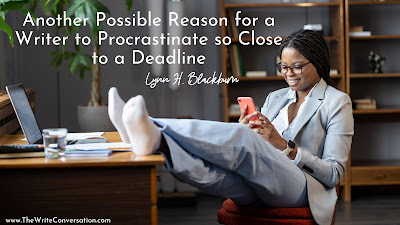
by Lynn H. Blackburn @LynnHBlackburn
I’ve learned over the past decade that in my writing process, I have two types of procrastination. One I’ve learned to lean into. The other is still driving me bonkers on a regular basis.
Allow me to explain.
When I complete a manuscript and am creatively depleted, I’ve learned to accept a certain level of procrastination before I begin a new project. I know that what looks like procrastination is actually how I refuel. (I wrote about this in April here: Inspiration & Encouragement for the Writer Who Has Nothing to Write )
But then there is deadline procrastination. And this one? Y’all. I cannot begin to tell you how much I wish I wasn’t wired this way!
Things I never want to do suddenly become burning desires. Projects I’ve put off tackling for months are now front and center in my mind, and they will not be silenced!
And the manuscript that should be taking up all of my energy? No desire whatsoever. If I feel anything at all, it’s more of an existential dread.
This is all fresh in my mind because I just turned in a manuscript. And I met my deadline.
But in the two weeks prior to submitting the manuscript, I spent an inordinate amount of time on the following crucial activities:
1. My nails. Y’all. I have no idea how many times I’ve painted my nails in the last few weeks. This is not normally a high priority for me. If I have my nails painted, and the polish chips? I just take it off and go about my business. But lately? Total manicure required.
If you’re thinking this is ridiculous, you’re not wrong. But trust me when I tell you it gets worse.
2. Carpet cleaning. Did the small amount of carpet we have in our home need to be cleaned? Yes. Did it need to be cleaned two weeks before my deadline? No. But that doesn’t mean I didn’t schedule it. Which led to…
3. Complete bonus room reorganization. My office is off of our bonus room, so I could be forgiven for wanting it to be tidy. But was it necessary to remove every item for the carpet cleaning and then use this opportunity to rework the whole room? It needed to be done. But two weeks before a deadline?
And once we started moving everything around, we realized there was an ancient cabinet that needed to go, so of course I needed a replacement which led to the …
4. Purchase and assembly of a new cabinet. I enjoy assembling things. Following the directions and watching it come together makes my heart happy. Which is why, despite my husband’s willingness to assist in this matter, because, again, I WAS ON A DEADLINE, I felt compelled to handle it all.by.myself. Which I did.
At this point, I was also nearing a mental breakdown because, oh, yeah, the deadline! So I worked hard for several days, wrote a bunch of words, and I was feeling pretty good about how focused I was, until I needed a birthday gift and spent more time than I’m willing to confess trying to figure out how to…
5. Make an origami baseball bat out of a dollar bill. I was unsuccessful.
What is wrong with me? How hard is it to just put my butt in the chair and write the words?
Well…for me? Pretty hard.
Also…for me? Part of the process.
Now, hear me out.
Do I like this aspect of my writing process? No.
Is this new? No.
Do I do this every single time? Sadly, yes.
When I started sending panicked text messages to my writer friends, they universally responded with, “Yeah, this isn’t our first rodeo with you. We know how this goes. You panic. Then you go off and write a gazillion words. And then you can’t land the plane (find the ending) and then you do. We aren’t worried. We love you even though you’re being dramatic, and we’re praying for you.”
I wish they were wrong. They weren’t.
Because see, during all that procrastinating, I was actually doing the hardest part of writing. While painting my nails, my brain was busy plotting. While building the cabinet, my mind was in Gossamer Falls trying to figure out how to kidnap someone who was well-protected. While watching origami videos…okay, I know this will be hard to believe, but I had a little flash of, “Oh, that’s what she needs to get out of this” based on a super random comment in a video.
And when I did put my rear in the chair, the words that fell into place came from the thinking I did while procrastinating.
So, is it really procrastinating? Or is it actually working on the book in a different way? Would I be less stressed if I accepted the way I get to the end of the book in the same way I’ve accepted the way I start my books? I’m not there yet, but maybe someday I will be.
I do know that I’ve begged God to change this for me. I’ve asked for the motivation, discipline, creativity, and endurance to kick in earlier.
And while God continues to say yes to the creativity, motivation, and endurance, it is always in His own time. Not gonna lie … On this last manuscript, I pointed out that I thought He was cutting it a little close.
But the fact remains that I come to the end of every project fully reliant on Him, knowing that I didn’t do the work on my own, and that I’m incapable of writing anything without Him.
And that isn’t something I ever want to change.
Grace and peace,Lynn
TWEETABLEAnother Possible Reason for a Writer to Procrastinate so Close to a Deadline from @LynnHBlackburn on @EdieMelson (Click to Tweet)
 Lynn H. Blackburn loves writing romantic suspense because her childhood fantasy was to become a spy, but her grown-up reality is that she's a huge chicken and would have been caught on her first mission. She prefers to live vicariously through her characters and loves putting them into all kinds of terrifying situations while she's sitting at home safe and sound in her pajamas!
Lynn H. Blackburn loves writing romantic suspense because her childhood fantasy was to become a spy, but her grown-up reality is that she's a huge chicken and would have been caught on her first mission. She prefers to live vicariously through her characters and loves putting them into all kinds of terrifying situations while she's sitting at home safe and sound in her pajamas! Unknown Threat, the first book in her Defend and Protect series, was a 2021 Christy Award finalist and her previous titles have won the Carol Award, the Selah Award, and the Faith, Hope, and Love Reader’s Choice Award. Malicious Intent, the second book in the series, released March 2022.
She is a frequent conference speaker and has taught writers all over the country. Lynn lives in South Carolina with her true love and their three children. You can follow her real life happily ever after by signing up for her newsletter at LYNNHBLACKBURN.COMand @LynnHBlackburn on BOOKBUB, FACEBOOK, TWITTER, PINTEREST, and INSTAGRAM.
Published on November 01, 2023 22:00
October 31, 2023
Why Writers Must Be Mean to Their Characters

by Sarah Sally Hamer @SarahSallyHamer
Are you mean? Do you go out of your way to harm others? I doubt it—most of us are really nice to everyone we meet. But, regardless of how you treat people in real life, writers HAVE to be mean to our characters to tell their stories. Because, without conflict, characters don’t change.
Almost every story has a “mean moment,” where the protagonist has to face the devil inside to make the changes necessary to meet their goal. It often is a subtle moment, one that may not even be obvious to most people. But it is probably the most important moment in the entire story.
Remember, the plot almost always starts with the main character wanting something (goal). They have an excellent reason for that need (motivation) and something to keep them from getting it (conflict). In a perfect world, the conflict comes from something within them—fear, anger, worry, etc.—which ultimately causes them to need that ah-ha moment of realization. So digging deep into your character’s psyche and allowing them to really experience the character arc can make a huge difference in your story.
How do we do that? By being mean!
Of course, different genres require different types of character arcs. The protagonist in a mystery or suspense novel probably doesn’t need to change a lot to solve the crime. It can happen, of course, especially when the villain and hero have a direct connection. For example, Clarise in Silence of the Lambs has to tell her story to Hannibal Lector to get the information she needs to save the senator’s daughter. By doing so, we see Clarise’s inner demons and why she is so fearful. Her determination to be the “good” agent has been there all along, but she needs to be almost dragged through her past to become one. In so many words, we had to be mean to her so she could meet her goal.
Adventure stories also don’t need a huge character arc. But in Galaxy Quest, we watch Jason, who plays the “James T. Kirk” character, go through a transformation from jerk to leader in one scene, where he admits to Mathesar (the captain of the alien ship) that he’s lied to him the whole time. And Jason has to change. We had to be mean to him, to make him admit his weakness, for him to grow enough to save the day.
Romance stories almost always have a Supreme Ordeal, as Joseph Campbell terms it, where the protagonists—hero and/or heroine—face those demons. In Pride and Prejudice, both Lizzie and Darcy have to make a change. Darcy is told, in no uncertain terms, that Lizzie loathes him and, as he says later, it made him realize that he had “been a selfish being all my life.” Lizzie also had to make an attitude change to see that Darcy was lovable. Jane Austen had to be mean to both of them for each to find happiness.
Being mean to your characters doesn’t mean that you want them to suffer. But suffering often brings change. We can give our characters a fatal flaw that holds them back. Clarise doesn’t think she can be an FBI agent. Why? Because of the wound from the past. Jason’s flaw is his arrogance. He’s been lauded for his acting role but his real life sucks. Darcy’s flaw is pride, of course, while Lizzie is prejudiced.
Figuring out how to make that happen usually goes straight back to the plot. WHAT do they want? WHY do they want it? WHY can’t they have it?
Let’s take a simple plot and see how mean we can be to a character:
Joe is an arrogant policeman who is trying to solve a murder case. (Goal—to find the murderer)
It’s his job to find the villain. (Motivation—he won’t get promoted)
Joe has made enemies in the department so no one will help him. (Conflict—he can't do it on his own)
The story starts with Joe believing he can find this criminal by himself. But no one in the department will have anything to do with him.
Now we get to be mean. He looks for clues, asks questions, goes through the forensic stuff, etc. But nothing makes sense. Usually at this point, another character—a mentor archetype—arrives and is assigned to him. Officer Susie becomes the change factor in the story even though arrogant Joe puts her down as often as possible. Scene after scene, he tries to do his job, but keeps running into obstacles—witnesses who won’t cooperate, for instance. But, eventually, Susie solves something he can’t or rescues him from his own stupidity. The Supreme Ordeal is when he finally—finally!—realizes that he does need help and she’s the one to make it happen.
We’ll still need to be mean to him as he now recognizes his own weaknesses, but now he starts showing her—and others—some respect and they are more willing to cooperate. He’s changed and he reacts in different, and more considerate, ways and they find and capture the criminal.
Do you see how it works? It’s not truly about being mean. It’s more about lessons that our characters learn as they tell their stories.
How about your characters? Are you being mean to them?
TWEETABLEWhy Writers Must Be Mean to Their Characters from @SarahSallyHamer on @EdieMelson (Click to Tweet)
 Sarah (Sally) Hamer, B.S., MLA, is a lover of books, a teacher of writers, and a believer in a good story. Most of all, she is eternally fascinated by people and how they 'tick'. She’s passionate about helping people tell their own stories and has won awards at both local and national levels, including two Golden Heart finals.
Sarah (Sally) Hamer, B.S., MLA, is a lover of books, a teacher of writers, and a believer in a good story. Most of all, she is eternally fascinated by people and how they 'tick'. She’s passionate about helping people tell their own stories and has won awards at both local and national levels, including two Golden Heart finals.A teacher of memoir, beginning and advanced creative fiction writing, and screenwriting at Louisiana State University in Shreveport for over twenty years, she also teaches online for Margie Lawson at WWW.MARGIELAWSON.COM. Sally is a free-lance editor and book coach, with many of her students and clients becoming successful, award-winning authors. You can find her at HAMERSE@BELLSOUTH.NET or WWW.SALLYHAMER.BLOGSPOT.COM
Published on October 31, 2023 22:00
October 30, 2023
The Writer's ABCs: Basic Building Blocks for Your Writing Journey
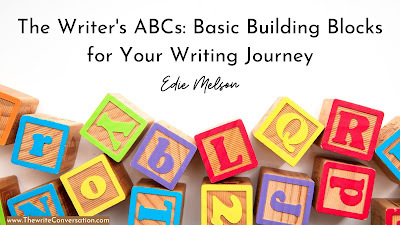
by Edie Melson @EdieMelson
I love to share posts using the ABCs. There's something so satisfying to coming up with the insight that goes with each letter. I admit, I'm addicted to it! You may remember one I wrote last year titled: Do You Know the ABCs of Writing? Well today I was inspired to write another, similar post. I decided to come up with some new suggestions and had a lot of fun playing with the content. I hope you enjoy it too!
Basic Building Blocks for Your Writing Journey
A is for Abundance. Write out of the overflow. Feed your soul and you'll always have the words you need to sustain your calling.
B is for Bravery. Don't shrink from the hard stuff, whether it's tough topics or just the courage to continue.
C is for Commonplace. Don't overlook the magic and beauty that surrounds you. It's the spaces between that often add depth and meaning to our words.
D is for the Details. Excellence is found in attention to every aspect of our craft.
E is for Encouragement. Use your words to encourage others along the way. Words have great power. Wield yours for good.
F is for Finite. Our time here on earth is limited, don't waste time and energy on what might occur.
G is for Gratitude. As frustrating as this love of words can be at times, it truly is a gift. Don't ever take it for granted.
H is for Hilarity. Don't forget to take time to see the humor that crops up unexpectedly. Laugh at yourself, at the circumstances, and especially at those who irritate you.
I is for...well...I. Don't neglect yourself. Take care of your body, your mind, and especially your soul.
J is for Jena se' qua. Which is French for that certain, undefinable quality that makes each of us special. Never doubt how incredibly special you are!
K is for Keeping on. Don't ever quit, no matter what.
L is for Lessons Learned. Sometimes the knowledge we have comes from our own experience, but often times it's gleaned from the experiences of those around us.
M is for Muscles. Writing is hard work. Keep up a regular writing schedule to stay in shape and continue to grow in your craft.
N is for No. Time to write comes only when we make the choice. Saying yes to writing means saying no to something else.
O is for Only. Only you can write from your one-of-a-kind perspective. Yes,we all have shared experiences and circumstances, but those are filtered through each of us, making our voice unique.
P is for Position (and possibilities). Ignore those behind you or you'll grow conceited, don't envy those in front or you'll grow discouraged. Instead look within and see the possibilities.
Q is for Quantity. Learn to write a certain amount every day, whether you find yourself in the mood or not. It's this discipline that will sustain you in the tough times to come.
R is for Respect. Respect yourself for following your dream and being brave enough to say the words, "I am a writer."
S is for Sadness. Embrace the full range of human emotions in your writing. A diet of nothing but sweetness and light cannot sustain anyone for very long.
T is for Talent and Time. Talent will get you nowhere, but time can lead you into forever.
U is for Unless. Unless you answer the call, your story may never be told.
V is for Villain. Never underestimate the power of a good villain to make a hero great—in a story and in life.
W is for What if....Two magical words that lead to an infinite world of possibilities through the pen of a writer.
X is for, Xylophone. Sometimes you have to hit it with a hammer to make the music heard.
Y is for Yes. Take a chance on success. Make it a habit to say yes to some of the scary opportunities that come your way.
Z is for Zigzag. I've found that as a writer, the most interesting path from point A to point B is rarely in a straight line. Almost all the good stuff is found in the detours.
I encourage you to use these thoughts to alphabetize your writing life. Can you suggest some others?
Don't forget to join the conversation!Blessings,Edie
TWEETABLEThe Writer's ABCs: Building Blocks for Your Writing Journey from @EdieMelson (Click to Tweet)
 Edie Melson is a woman of faith with ink-stained fingers observing life through the lens of her camera. No matter whether she’s talking to writers, entrepreneurs, or readers, her first advice is always “Find your voice, live your story.” As an author, blogger, and speaker she’s encouraged and challenged audiences across the country and around the world. Her numerous books reflect her passion to help others develop the strength of their God-given gifts and apply them to their lives. Connect with her on her website, through Facebook, Twitter and Instagram.
Edie Melson is a woman of faith with ink-stained fingers observing life through the lens of her camera. No matter whether she’s talking to writers, entrepreneurs, or readers, her first advice is always “Find your voice, live your story.” As an author, blogger, and speaker she’s encouraged and challenged audiences across the country and around the world. Her numerous books reflect her passion to help others develop the strength of their God-given gifts and apply them to their lives. Connect with her on her website, through Facebook, Twitter and Instagram.
Published on October 30, 2023 22:00
October 29, 2023
A Tongue-in-Cheek Look at 17 Reasons Writers are Scared of Social Media
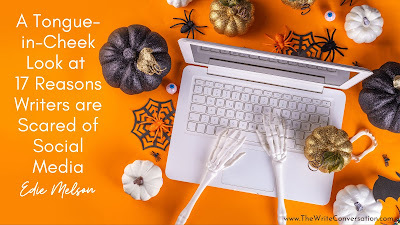
by Edie Melson @EdieMelsonIt's October and in honor of Halloween, I just couldn't resist a tongue-in-cheek post about something scary. After spending the fall traveling and teaching social media I have plenty of fears to share. Lest you think this is me pointing fingers, let me reassure you. EVERY single one of the things listed has been something I've done/struggled with at some point. And these are helpful tips about social media for writers.
Remember, none of us is born knowing how to do this stuff. So lets laugh at our phobias together!
17 Scariest Things About Social Media for Writers
1. Having to have a picture taken to use as an avatar. Someone please reassure me that I'm not the only person who hates having her picture taken!
2. Trying to figure out the point of Twitter. HINT: Use Hootsuite. The columns can help you pull out what's relevant. Otherwise you're stuck trying to pull something meaningful from the home feed.
3. The pressure of taking beautiful pictures for Instagram. I'm an amateur photographer, but at times it feels like so much pressure to make sure something is Instagram-worthy.
4. Working to make my social media names match across platforms. Okay, this one wasn't much of an issue for me - except for the fact that my memory is bad. For a while I was using Edie Melson and Edie G Melson.
5. Receiving friend requests on Facebook. Have you seen some of the creepers that hang out on FB? They are sometimes the stuff of nightmares! LOL!
6. Refusing friend requests on Facebook. No not the creepers from #5. The ones I feel guilty and agonize over are those where we have lots of friends in common, but I don't actually know them. I've learned the hard way to say no to requests from people I don't know.
7. Political rants. 'nuff said
8. Taking a FB quiz and discovering your steampunk name is Dame Beatrice Kettlebottom. Seriously. It was a huge disappointment and definitely something I did NOT share on FB.
9. Discovering my life isn't beautiful enough to be on Pinterest. Where do these people find the time—not to mention the money to do this stuff???
10. Finding out Facebook is changing their Edgerank algorithm yet again. It seems like they have a think tank whose only goal is to think of as many ways as possible to sabotage our efforts?
11. Realizing you used the word your instead of you're in a grammar rant. I really try to avoid posing when I'm frustrated. This is the reason why.
12. Posting a beautiful meme with the perfect quote and discovering you’ve got the attribution wrong. Yep, it happened to me. All I can say is be sure to check and double-check who said what you're sharing.
13. Sharing a light-hearted update and getting angry and/or weird comments. When this happens I can't decide if what I said was unclear or the people commenting are just a little dense.
14. Learning how to use hashtags. Now that I know how, they're great. But learning the best ways took time.
15. Anything to do with snap chat. If someone says Snap Chat to me, I mentally stuff my fingers in my ears and try to ignore anything that's said.
18. Trying to Find the Time to actually DO social media. My schedule is slammed full and some days it seems I can't add one more thing.
17. The scariest thing ever with social media is refusing to do it and missing out on a book contract because you have no platform!
I lost a book contract in the mid-nineties because I didn't have a platform. That's one of the reasons I made sure it would never happen again. But truthfully, I hear stories about this happening on a weekly basis.
This is my list. What scares you the most about social media. Leave your answers in the comments section below!
Don't forget to join the conversation!Blessings,Edie
TWEETABLEA Tongue-in-Cheek Look at 17 Reasons Writers are Scared of Social Media - @EdieMelson (Click to Tweet)
 Edie Melson is a woman of faith with ink-stained fingers observing life through the lens of her camera. No matter whether she’s talking to writers, entrepreneurs, or readers, her first advice is always “Find your voice, live your story.” As an author, blogger, and speaker she’s encouraged and challenged audiences across the country and around the world. Her numerous books reflect her passion to help others develop the strength of their God-given gifts and apply them to their lives. Connect with her on her website, through Facebook, Twitter and Instagram.
Edie Melson is a woman of faith with ink-stained fingers observing life through the lens of her camera. No matter whether she’s talking to writers, entrepreneurs, or readers, her first advice is always “Find your voice, live your story.” As an author, blogger, and speaker she’s encouraged and challenged audiences across the country and around the world. Her numerous books reflect her passion to help others develop the strength of their God-given gifts and apply them to their lives. Connect with her on her website, through Facebook, Twitter and Instagram.
Published on October 29, 2023 22:00
October 28, 2023
When Your Writing Dreams Are Postponed
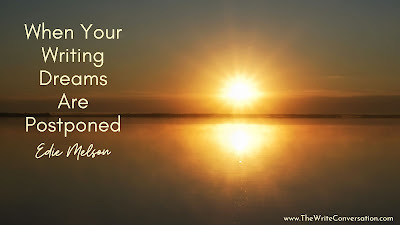
by Edie Melson @EdieMelson
Now to him who is able to do far more abundantly than all that we ask or think, according to the power at work within us, to him be glory in the church and in Christ Jesus throughout all generations, forever and ever. Amen. (Ephesians 3:20 - 21 ESV)
I was recently in Florida for the Florida Christian Writer's Conference . One of my favorite things—outside of all the writing related-blessings—is getting up to take sunrise pictures. I'm never alone for sunrise, there are always a good-sized group of us who enjoy starting the day this way.
On this particular morning there was a big cloud bank, just above the horizon, blocking the area where the sun would come up. We hoped there would be pretty sun rays even though we wouldn't be able to see the sun come up--or maybe even some beautiful colors in the clouds.
But as the clocked showed us astronomical sunrise, the sky remained bland. Many of our group drifted away to breakfast, unwilling to wait and see if there would be any beautiful pictures when the sun finally made it past the wall of clouds.
As I waited, still hopeful, my thoughts turned to my own publishing journey. So many times during the years it seemed like my writing was destined to remain hidden. My own publishing timeline was delayed well beyond what other writers experienced. But I remained hopeful, certain that God had called me to write. Some of the others who faced delays gave up.
Standing on the dock, I began to see the sky lighten behind the clouds. The sun was about to make its entrance. Sure enough, as you can see from the image above, the sunrise didn't disappoint, it was spectacular.
The same thing happened with my publishing journey. My path didn't look like I expected, and the time-frame wasn't what I would have chosen. But the outcome has been so far beyond what I hoped and dreamed, words to describe it fail me.
So my encouragement is for you today is three-fold:
First, stay faithful. God has a plan. Second, you did not misunderstand His call. Third, get ready for God to blow you away with His blessings. I know it's easy to get discouraged while waiting for your writing dreams to blossom, but it's work the wait!
TWEETABLEWhen Your Writing Dreams Are Postponed, insight from @EdieMelson (Click to Tweet)
 Edie Melson is a woman of faith with ink-stained fingers observing life through the lens of her camera. No matter whether she’s talking to writers, entrepreneurs, or readers, her first advice is always “Find your voice, live your story.” As an author, blogger, and speaker she’s encouraged and challenged audiences across the country and around the world. Her numerous books reflect her passion to help others develop the strength of their God-given gifts and apply them to their lives.Connect with her on her website, through Facebook, Twitter and on Instagram.
Edie Melson is a woman of faith with ink-stained fingers observing life through the lens of her camera. No matter whether she’s talking to writers, entrepreneurs, or readers, her first advice is always “Find your voice, live your story.” As an author, blogger, and speaker she’s encouraged and challenged audiences across the country and around the world. Her numerous books reflect her passion to help others develop the strength of their God-given gifts and apply them to their lives.Connect with her on her website, through Facebook, Twitter and on Instagram.
Published on October 28, 2023 22:00



